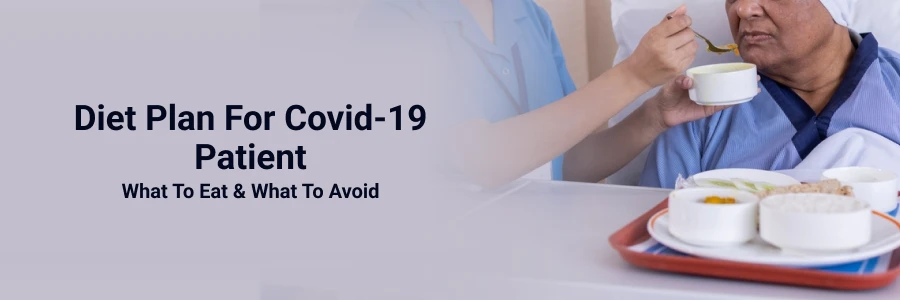- Cardiology 84
- Dermatology 45
- Endocrinology 33
- ENT 16
- Fertility 190
- Gastroenterology 78
- General-Medicine 81
- Gynecology 80
- Hematology 19
- Infectious-Diseases 33
- Neurology 52
- Oncology 34
- Ophthalmology 23
- Orthopedics 69
- Pediatrics 31
- Procedure 23
- Public-Health 144
- Pulmonology 59
- Radiology 8
- Urology 68
- Wellness 161
- Woman-and-child 77

Diet Plan for Covid-19 Patients: Eat Right to Avoid Risks
Nutrition is essential for COVID-19 patients as well as those who are on the way to recovery. The body becomes weakened during COVID-19, and this weakness lasts for days after the symptoms have subsided. As a result, eating the right kind of diet is critical for a fast and full recovery of the body.
What Food Should Be Given to COVID-19 Patients?
Early Morning
First thing in the morning, eat 6-7 soaked almonds, 2-3 walnuts, and 5-6 raisins. COVID-19 patients can also take a concoction of ginger, coriander seeds, and tulsi.
Breakfast
According to her, breakfast options include besan, dal, ragi spinach cheela with mint chutney, vegetable poha or idli sambhar/uttapam with coconut chutney, and a stuffed omelette with spinach, corn, and avocado.
It is also suggested that you drink a glass of buttermilk. After breakfast, a person can also have coconut water, beetroot, spinach, or amla juice.
Lunch
Zeera rice, ajwain roti, rajma, gajar matar sabzi, and curd or egg rice, ajwain roti, methi aloo, dal of choice, and curd or vegetable daliya, curd and chickpea dish.
Evenings
Throughout the evening, you can enjoy a cup of herbal tea and a bowl of rajma, chola, corn, sweet potato, or sprouts chaat. She also recommended that you eat fruit, such as a kiwi, peach, banana, apple, papaya, or pineapple.
Dinner
Dinner options include moong dal khichdi with vegetables, rice chicken vegetable cup, or garlic roti with paneer bhurji and mixed vegetables.
As you can see, the diet plan contains foods that are high in vital nutrients, which can aid in the COVID-19 patient's fast recovery.
If you have a stomach upset, veg khichdi, dal rice, sambar rice, curd rice, soup, and toast are good choices. Foods high in empty calories and saturated fats, fried foods, and sugary beverages should all be avoided.
Avoid These Foods for Covid-19 Patients
- Processed Foods
- Sugary Foods and Beverages
- Fried and Fatty Foods
- Alcohol
- Caffeinated Beverages
- Excessive Salt
- Raw or Undercooked Foods
- Allergenic Foods
- Large Meals
Diet Chart for COVID-19 Patients
This diet plan emphasizes foods high in essential nutrients to aid in the fast recovery of COVID-19 patients. It also recommends avoiding processed foods, sugary beverages, and other unhealthy choices.
|
Time |
Food Options |
|
Early Morning |
6-7 soaked almonds, 2-3 walnuts, 5-6 raisins, a Concoction of ginger, coriander seeds, and tulsi |
|
Breakfast |
Besan, dal, ragi spinach cheela with mint chutney, Vegetable poha or idli sambhar/uttapam with coconut chutney, Stuffed omelette with spinach, corn, and avocado. |
|
Lunch |
Zeera rice, ajwain roti, rajma, gajar matar sabzi, and curd Egg rice, ajwain roti, methi aloo, dal, and curd Vegetable daliya, curd, and chickpea dish |
|
Evening Snack |
Herbal tea, Bowl of rajma, chola, corn, sweet potato, or sprouts chaat, Fruit (kiwi, peach, banana, apple, papaya, pineapple) |
|
Dinner |
Moong dal khichdi with vegetables, Rice, chicken, vegetable curry, Garlic roti with paneer bhurji and mixed vegetables |
|
If Stomach Upset |
Veg khichdi, Dal rice, Sambar rice, Curd rice, Soup and toast |
|
Foods to Avoid |
Processed foods, Sugary foods and beverages, Fried and fatty foods, Alcohol, Caffeinated beverages, Excessive salt, Raw or undercooked foods, Allergenic foods, Large meals |
Frequently Asked Questions
Focus on a balanced diet rich in fruits, vegetables, lean proteins, whole grains, and healthy fats. Stay hydrated with water, herbal teas, and broths. Avoid processed foods, sugary snacks, and excessive caffeine or alcohol.
Rest, stay hydrated, and follow medical advice. Maintain a nutritious diet, practice good hygiene, and monitor symptoms closely. Seek medical attention if symptoms worsen or if you have difficulty breathing.
Gradually reintroduce nutritious foods to support recovery. Emphasize foods rich in vitamins, minerals, and antioxidants, such as fruits, vegetables, lean proteins, and whole grains. Stay hydrated and prioritize sleep and stress management.
Follow medical advice and treatment protocols prescribed by healthcare professionals. This may include antiviral medications, supplemental oxygen, or other supportive therapies tailored to individual needs.

- Cardiology 2132
- Dermatology 168
- Endocrinology 135
- ENT 97
- Fertility 217
- Gastroenterology 232
- General 478
- General-Medicine 1685
- Gynecology 169
- Hematology 85
- Infectious-Diseases 208
- Neurology 207
- Oncology 345
- Ophthalmology 65
- Orthopedics 187
- Pediatrics 83
- Procedure 72
- Public-Health 209
- Pulmonology 126
- Radiology 13
- Second Opinion 311
- Urology 294
- Wellness 600
- Woman-and-child 447
Related Blogs
If you have any questions, please fill out the enquiry form or call us, and we will get back to you promptly.
040-68334455